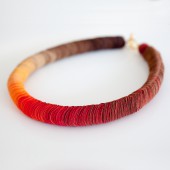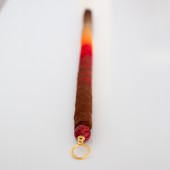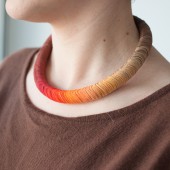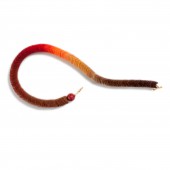
| THE AWARD |
| CATEGORIES |
| REGISTRATION |
| SUBMIT YOUR WORK |
| ENTRY INSTRUCTIONS |
| TERMS & CONDITIONS |
| PUBLICATIONS |
| DATES & FEES |
| METHODOLOGY |
| CONTACT |
| WINNERS |
| PRESS ROOM |
| GET INVOLVED |
| DESIGN PRIZE |
| DESIGN STORE |
| THE AWARD | JURY | CATEGORIES | REGISTRATION | PRESS | WINNERS | PUBLICATIONS | ENTRY INSTRUCTIONS |
Degrade Line Necklace by maria eftychi |
Home > Winners > Design #46299 >Interview |
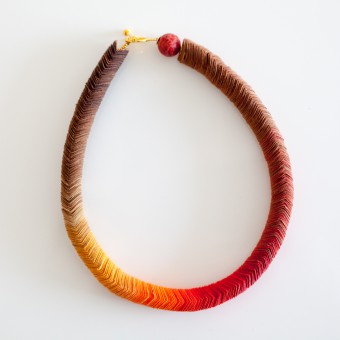 |
|
FS: What is the main principle, idea and inspiration behind your design?
ME: I always had this idea about a color degrade line that sits around your neck and when i started working with paper I realized it was a great material to experiment with this notion. The thin thickness of the material allows the gradual merge between different colors. The Degrade Line is the combination of two different collections of Design m.e the FOLD and the DEGRADE. The DEGRADE was obviously related to this gradual color merge while the FOLD is a series of jewels related to the geometrical structure and the action of folding pieces of paper to craft the final pieces.
FS: What has been your main focus in designing this work? Especially what did you want to achieve?
ME: The main focus was to succeed a smooth geometrical merge and to found a suitable finishing that would suit this specific design. The coral ball in the finishing part, brings back a touch of red and a similar sense of volume as the rest of the piece. The golden plated silver clasp remained classical keeping its practicality in the usage.
FS: What are your future plans for this award winning design?
ME: I would like to create an extended collection based on 'Degrade Lines' with different color merges and promote it through all the opportunities that the A' Design Awards offer.
FS: How long did it take you to design this particular concept?
ME: As I said the 'Degrade Line' Necklace is a combination of two existing collections which took 6 months to come to life fully. After that the specific design concept was a natural outcome and it took a week for the design and crafting, and one more week testing the best finishing part for it.
FS: Why did you design this particular concept? Was this design commissioned or did you decide to pursuit an inspiration?
ME: It was a combination in fact. The initial first piece was from a client who was asking me for an order. That specific order was from the FOLD series but it was not possible to remake because it was made from a very specific recycled paper. She then told me that she trusted me to make something similar with tones of blue. I took the initiative to pursuit the 'degrade line' inspiration and i created a similar piece to the awarded one but in tones of dark and blue, turquoise etc. The finishing piece inspired me to create more and one of them was the awarded piece.
FS: Is your design being produced or used by another company, or do you plan to sell or lease the production rights or do you intent to produce your work yourself?
ME: Currently I am designing and crafting the jewels myself, but i would like to systematize more my production process for the future development.
FS: What made you design this particular type of work?
ME: I got intrigued to design and craft something out of all this paper waste i experience everyday. Design m.e was born like this. The particular design evolved through experimentation of folding and merging different paper pieces. The extremely thin thickness of paper for me was very challenging because it is where the fragility but also all the charm and flexibility comes from. The way you can mix the colors reminds me the way a paint brush is mixing colors, with a very high resolution.
FS: Where there any other designs and/or designers that helped the influence the design of your work?
ME: As an architect I am influenced a lot by my training as an architect and folding techniques are a typical experimentation in architecture, as well as exploring the properties of each material to give a form inside those limits. Some years ago 2009 I also attended a great exhibition in New York Design Museum: Slash: Paper under the knife' which gave me a great deal of inspiration on paper techniques and approaches.I was particularly amazed by the work of Olafur Eliasson, the 'House', a series of carved books. I got stuck i think on this idea that collectively paper layers can create a very solid volume a contradicting aspect of paper as we know it as a surface. Tomas Gabzdil Libertiny created very solid vases out of 700 paper prints exploring also this essence of volume out of paper. This exhibition was amazing and a great source of inspiration for me.
FS: Who is the target customer for his design?
ME: I think any woman that is interested in jewelries out of the ordinary and at the same time shares the same values of sustainability and re-usability. The woman of Design m.e has more of a personal style than a certain fashion trend approach. Through the design of the obvious Design m.e redefines elegance and adds value to a common material creating pieces that are to beloved as such not as part of trend. She loves simplicity and this contemporary definition of elegance.
FS: What sets this design apart from other similar or resembling concepts?
ME: Behind Design m.e there is a wealth of knowledge on design and form deriving from several years of experience in architectural practice, a high demanding design field. This with the combination of such an uncommon material as paper for the use of luxury products sets apart this design. The attention to detail, the finishing theme, the proper exploitation of material properties, the simplicity of a concept, the ergonomics and usability are parameters that are not always incorporated to regular crafted pieces that are found in the market today.
FS: How did you come up with the name for this design? What does it mean?
ME: 'Degrade Line' encapsulates in two words the concept of the necklace. A colorful degrade lime around your neck.
FS: Which design tools did you use when you were working on this project?
ME: modeling mainly, and sketching
FS: What is the most unique aspect of your design?
ME: preserving elegance femininity and simplicity while using unexpected materials such as paper and recycling paper.
FS: Who did you collaborate with for this design? Did you work with people with technical / specialized skills?
ME: Mainly i have created and crafted the necklace myself but i have discussed before some details with the owner of Katia's Treasure a jewellery designer and maker, acknowledged in Cyprus for her 20 year experience practice in the local jewelry design world.
FS: What is the role of technology in this particular design?
ME: The production of this piece is relatively low tech but in the upcoming development, I want to systematize it in multiple levels and that is where more elaborate machines will be needed. This will be also relevant for a bigger quantity production.
FS: Is your design influenced by data or analytical research in any way? What kind of research did you conduct for making this design?
ME: Although this design is made low tech I am conscious that it carries a lot of inspiration in parametric design(my Master's Degree in Barcelona) a field that is strongly related to data and analytical research. The repetition, the replication of one single piece of paper, the parameter of color which is gradually changing, the twisted possibilities of the overall structure the exploration of material properties are all rooted in those researches that have been conducted during and after my Master's Degree in those fields.
FS: What are some of the challenges you faced during the design/realization of your concept?
ME: The biggest challenge for this necklace was to succeed a smooth degradation of colors not only by picking the right colors but by merging them in a mathematical order that mixes two colors together gradually! It took some tests to reach the final result. The creative research includes also experimentation with folding techniques spacing between the pieces or not, rigidity issues and color degradation inspired from different sources in each piece.
FS: How did you decide to submit your design to an international design competition?
ME: Ι had really good feedback from clients and some professionals and I believed strongly that Design Line is a piece that you don' t see everyday while preserving elegance and simplicity, it has some authenticity. This authenticity i think is what we look when we add that extra jewel everyday. That piece which by being out of the ordinary itself renders our deep need to express our own individuality.
FS: Thank you for providing us with this opportunity to interview you.
A' Design Award and Competitions grants rights to press members and bloggers to use parts of this interview. This interview is provided as it is; DesignPRWire and A' Design Award and Competitions cannot be held responsible for the answers given by participating designers.
| SOCIAL |
| + Add to Likes / Favorites | Send to My Email | Comment | View Press-Release |
